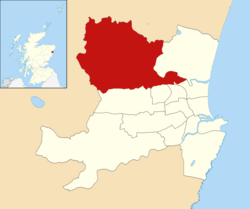
Aberdeen City Council is the local authority for Aberdeen City, one of the 32 council areas of Scotland. In its modern form it was created in 1996. Aberdeen was formerly governed by a corporation from when it was made a burgh in the twelfth century until 1975. Between 1975 and 1996 the city was governed by City of Aberdeen District Council, a lower-tier authority within the Grampian region.

Local government in Scotland comprises thirty-two local authorities, commonly referred to as councils. Each council provides public services, including education, social care, waste management, libraries and planning. Councils receive the majority of their funding from the Scottish Government, but operate independently and are accountable to their local electorates. Councils raise additional income via the Council Tax, a locally variable domestic property tax, and Business rates, a non-domestic property tax.

Aberdeen North is a burgh constituency of the House of Commons of the Parliament of the United Kingdom and it elects one Member of Parliament (MP) by the first past the post system of election. It was first used in the 1885 general election, but has undergone various boundary changes since that date. The seat has been held by Kirsty Blackman of the Scottish National Party since 2015.
The Politics of Aberdeen, Scotland have changed significantly in recent years. In 1996, under the Local Government etc. (Scotland) Act 1994, Grampian Regional Council and Aberdeen District Council were dissolved, creating the new unitary Aberdeen City Council to represent the city's council area.

The 2007 Aberdeen City Council election took place on 3 May 2007 to elect members of Aberdeen City Council, at the same time as the Scottish Parliament general election. The election was the first one using 13 new wards created as a result of the Local Governance (Scotland) Act 2004, with each ward electing three or four councillors using the single transferable vote system a form of proportional representation. The new wards replaced 43 single-member wards, which used the plurality system of election.

Aberdeen Donside is a constituency of the Scottish Parliament (Holyrood) covering part of the Aberdeen City council area. It elects one Member of the Scottish Parliament (MSP) by the first past the post method of election. It is one of ten constituencies in the North East Scotland electoral region, which elects seven additional members, in addition to the ten constituency MSPs, to produce a form of proportional representation for the region as a whole.

The 2012 Aberdeen City Council election took place on 3 May 2012 to elect members of Aberdeen City Council. The election used the 13 wards created as a result of the Local Governance (Scotland) Act 2004, with each ward electing three or four Councillors using the single transferable vote system form of proportional representation, with 43 Councillors elected.

Elections to South Lanarkshire Council took place on 4 May 2017 on the same day as the 31 other Scottish local government elections. As with other Scottish council elections, it was held using single transferable vote (STV) – a form of proportional representation – in which multiple candidates are elected in each ward and voters rank candidates in order of preference.
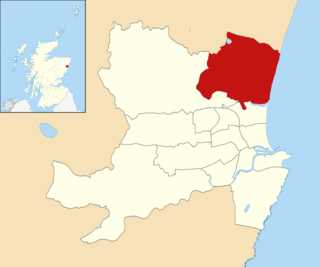
Bridge of Don is a ward represented in the Aberdeen City Council since 2017 by Sarah Cross of the Conservative Party, Alison Alphonse and Jessica Mennie, both of the Scottish National Party, and Nurul Hoque Ali of the Labour Party.
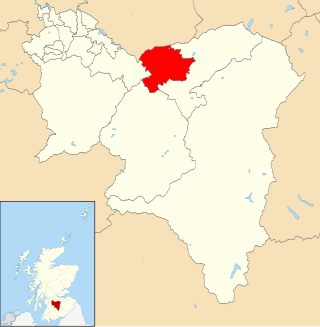
Clydesdale West is one of the 20 electoral wards of South Lanarkshire Council. Created in 2007, the ward elects four councillors using the single transferable vote electoral system and covers an area with a population of 19,350 people.

Clydesdale South is one of the 20 electoral wards of South Lanarkshire Council. Created in 2007, the ward elects three councillors using the single transferable vote electoral system and covers an area with a population of 14,621 people.
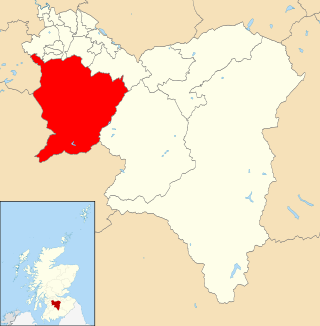
Avondale and Stonehouse is one of the 20 electoral wards of South Lanarkshire Council. Created in 2007, the ward initially elected four councillors using the single transferable vote electoral system before a boundary review in 2017 reduced the number of councillors to three. It covers an area with a population of 17,749 people.

East Kilbride Central North is one of the 20 electoral wards of South Lanarkshire Council. Created in 2007, the ward initially elected four councillors using the single transferable vote electoral system and covers an area with a population of 16,547 people. Following a boundary review, the ward has elected three councillors since 2017.

East Kilbride West is one of the 20 electoral wards of South Lanarkshire Council. Created in 2007, the ward elects three councillors using the single transferable vote electoral system and covers an area with a population of 13,737 people.
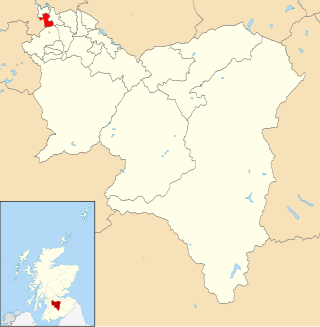
Rutherglen South is one of the 20 electoral wards of South Lanarkshire Council. Created in 2007, the ward elects three councillors using the single transferable vote electoral system and covers an area with a population of 15,322 people.

Cambuslang West is one of the 20 electoral wards of South Lanarkshire Council. Created in 2007, the ward elects three councillors using the single transferable vote electoral system and covers an area with a population of 14,096 people.

Elections to the City of Edinburgh Council took place on 5 May 2022 on the same day as the 31 other Scottish local government elections. As with other Scottish council elections, it was held using single transferable vote (STV) – a form of proportional representation – in which multiple candidates are elected in each ward and voters rank candidates in order of preference.

Elections to Fife Council took place on 5 May 2022 on the same day as the 31 other Scottish local government elections. As with other Scottish council elections, it was held using single transferable vote (STV) – a form of proportional representation – in which multiple candidates are elected in each ward and voters rank candidates in order of preference.
Elections to North Lanarkshire Council took place on 5 May 2022 on the same day as the 31 other Scottish local government elections. As with other Scottish council elections, it was held using single transferable vote (STV) – a form of proportional representation – in which multiple candidates are elected in each ward and voters rank candidates in order of preference.

Elections to Aberdeen City Council took place on 5 May 2022 on the same day as the 31 other Scottish local government elections. As with other Scottish council elections, it was held using single transferable vote (STV) – a form of proportional representation – in which multiple candidates are elected in each ward and voters rank candidates in order of preference.
